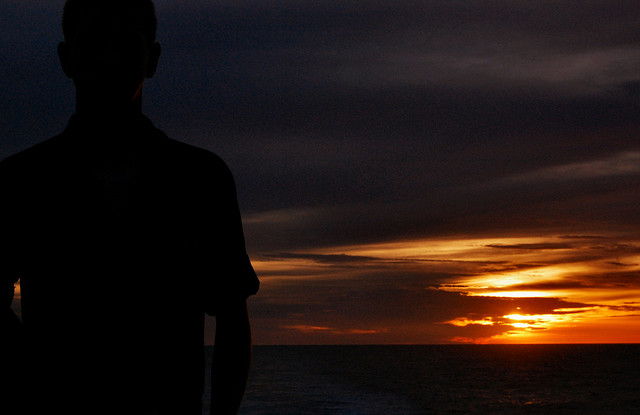“Remembering a wrong is like carrying a burden on the mind.” ~Buddha
It was a beautiful spring morning when I was terminated from my job. Before it happened, there were rumors, but I refused to believe that something like that could actually happen to me. I felt betrayed by the manner in which the termination occurred.
Without any substantiation, my company suggested that my ethics were compromised and I embezzled from the company funds. Soon thereafter I learned that the sole motive for the company was to replace me and my assistant with part-time employees to avoid paying full-time employee wages and benefits.
In reality, I worked hard, and often went out of my way for the benefit of the company. And yet, I got laid off.
At first I was shocked in disbelief, with anger and resentment following close behind. I even contacted a couple of attorneys to see if I may have a case. As time went on, I actually realized that losing this job was probably the best thing for me. I moved on.
Or so I thought…
When there is suppressed anger and resentment, we don’t really move on at all. We have a way of pushing away unpleasant emotions. We push away anger and resentments.
But these emotions get stored and accumulate in our subconscious. And while consciously we remain unaware of the damage they cause, they reveal themselves in our physical and emotional health. So there I was, going on with my life not realizing that on a deeper level, I was still holding on to the past.
My suppressed anger ended up rearing its ugly head in both my personal and professional lives. It affected the way I interacted with people around me and reflected in my health. I got diagnosed with depression.
Disbelieving that something was actually wrong with me, I was caught off guard at first. But inevitably, I had to face the truth. I had to become a good observer of myself and my emotions.
I had to teach myself the difference between “thinking” that I was well and actually “being” well. Gradually, I learned. Gradually, I dug deep enough to see the truth. And the day that I honestly saw my anger and pain was the day that I took my first step toward forgiveness—and freedom.
When Mahatma Gandhi was dying, he raised his hands up from his bullet wound and gestured a sign of forgiveness to his assassin. This drastic example illustrates that Mahatma Gandhi knew that forgiveness came from sacrifice and love.
Over a year after I got laid off, I felt compelled to write an email to the person responsible for letting me go. I told him that I was OK and that I harbored no hard feelings. I also thanked him for sending me on the journey of self-discovery.
Today, I am still learning and observing. I am not angry or in pain anymore. I build on what I’ve learned, expanding my forgiveness far beyond the confines of my personal life. Because when it works within myself, I know that it must work for the rest of the universe.
By learning to offer forgiveness, I learned about peace. If you’ve been holding onto resentments in your life, create peace for yourself:
1. Forgive personally.
Make an inventory of people in your personal life toward whom you may be experiencing negative emotions. These people may be members of your own family, your friends, or colleagues. Forgiveness on the personal level opens up communication and opens the path to rebuild relationships.
Certainly, personal forgiveness can also be expressed toward ourselves. It is possible to hold a grudge with yourself for the bad choices that you’ve made in the past, or for harming others in some way. This forgiveness offers a huge amount of emotional release to everyone involved.
2. Forgive spiritually.
In order to know peace, we must recognize that we are all connected. We must establish common ground by communicating and trying to understand one another. We are all made of the same love—and a big part of love is forgiveness. It’s what allows us to liberate our hearts from pain.
3. Forgive socially.
To forgive socially is to forgive on a universal scale. We must look beyond our homes, beyond our land, and beyond our culture. We must forgive those who we can’t see. Let’s find it in ourselves to offer forgiveness to distant lands, to people in other countries, and in different cultures.
This planet has seen enough hatred and discontent. Hatred leads to more hatred, and this world may not know true peace until forgiveness leads us toward mutual understanding and acceptance. Make a stand today not to allow any more negative energy spread into the world.
When we forgive someone, we are healing ourselves within. We don’t necessarily have to love, or even like someone in order to forgive them. The forgiveness can be offered internally, with lasting positive and healing consequences for our own lives.
Release your negative emotions. Fill your heart with compassion and love. Begin by forgiving a single deed or a single person today. Build on that to encompass the world. You will notice a wonderful transformation in your life.
Photo by Jayel Aherem
About Vlad Rapoport
Vlad is a certified meditation instructor and a spiritual counselor. He helps people transform their lives through a journey of self discovery. He encourages people to shed the non essential to experience a purpose filled life. Vlad writes on these subjects at Simpler Life Today.














 Though I run this site, it is not mine. It's ours. It's not about me. It's about us. Your stories and your wisdom are just as meaningful as mine.
Though I run this site, it is not mine. It's ours. It's not about me. It's about us. Your stories and your wisdom are just as meaningful as mine.
FANTASTIC!!!!!!!!!
Thank you, glad you enjoyed it! 🙂
My husb lost his longtime job on Dec 8, 2011. Like many of you, it wasn’t expected. It was a merger & his position was eliminated. Since then, we have had one tragedy after another. We’re being evicted, lost our vehicle, have had days with no food, etc…..And, I find myself blaming his company, sometimes myself and occasionally my own husband.
But, you’re all right, I have to learn to forgive and move on. I feel as if my own negativity and bad feelings are making it hard for us to move on. So, today, I’m going to try to forgive. And, I’m hoping it will allow me to start moving on in life…..
Sometimes through “depression” it’s so hard to see the light on the other side. Since we’ve lost everything, I’m feeling so down. Almost “suicidal”….if I may be honest. I’m scared, sad & hopeless.
But, after reading these (and other posts) I’m feeling hopeful. I’m going to try everyone’s advice and let go, forgive, stop hating, etc…..
Thank You ~
I know how you feel.people don’t know what you going threw it the worse thing ever.wanting not to live. I hope you get your life back together my heart go out to you both.I experience being sack after 17 years just because I change the role.I going for a interview next Monday and I hope to God my life change. Just keep chin up light at the end of the tunnel I will pray for you both please take care God Bless xx
I thank God for reading this i look ahead into practicing and anxiously hoping for positive results, Some years ago i went through difficulties in my relationship my then boyfriend accused m of cheating him with a certain man which was a lie,my parents were forcing m to get married to a man who was a reason for my boyfriend to doubt m just because the man was welloff,and he personally went home to see my parents to made them convince me to marry him
I was frustrated i ended up my relationship with my boyfriend and good for him he married another woman last year,with all those happening my best friend whom we shared alot of heart to heart talk was against m while i was always there for her through her worst time
am still looking for my peace as i smhw still hv contact with her and i normally hide my grudge with smile whenever we meet.
Strange enough i heard rumours that she is in process of getting married with the man i was accused of cheating with,am praying for their happiness if its true and i look ahead into releasing them so that i can permanently be cured……
“This planet has seen enough hatred and discontent. Hatred leads to more hatred, and this world may not know true peace until forgiveness leads us toward mutual understanding and acceptance. Make a stand today not to allow any more negative energy spread into the world.”
I absolutely agree, and this is something I work on daily. It’s also the reason why I will never be happy or celebrate when someone “bad” dies. It always saddens me to see an outpouring of celebration over anyone’s death. The saying “an eye for an eye makes the whole world blind” is so true.
I do agree with you saying you had been saddened by the celebration of death in our country.One comes to my mind recently that was from the Middle East.Yes I agreed with the rationale for why they were celebrating the death of such an evil person,my soul was silently murmuring,”this is not right when men celebrate,laugh over death”
Thank you Alannah,
I agree completely. The negative vibration of hatred is not “good” or “bad”. It doesn’t know the difference. It’s just a negative force that affects everyone involved. Good thing that we have Love as the antidote!
Beautiful! Anger is so toxic and forgiveness is really such a gift to yourself. I remember my watershed moment when I realized you can forgive without condoning the action. So glad you were able to do that, and share with the rest of us! Thank you.
Hi Lisa,
Sometimes it’s difficult for people to differentiate between condoning and forgiving.It becomes a major realization that it’s indeed possible to forgive without condoning. Thank you for your thoughts!
Beautiful! Anger is so toxic and forgiveness is really such a gift to yourself. I remember my watershed moment when I realized you can forgive without condoning the action. So glad you were able to do that, and share with the rest of us! Thank you.
Love your,”Lisa @Just here.just now.”
So simple,so true
i was terminated after 18 years with no warning. I can so relate……..it was 2 years ago Jan 21 and I still feel that i have not recovered.
Wow, 18 years is along time. I’m sure that it wasn’t personal. Sometimes life itself dictates our next move. All the best to you!
Thank you for reminding us of the “Levels of Forgiveness” Anger runs deep and can manifest itself in SO MANY ways. I check my heart daily for forgiveness to myself, and to others…
Hi Julie,
Keeping inventory of your feelings is very healthy. You definitely don’t want to be angry with yourself! Thank you for the comment.
Sometimes i find it difficult to distinguish between “to forgive” and “to forget”!
I am trying to forgive someone, but everytime i see that person, hatred, anger … Everything comes back again! It’s like that person is my reset button!
Hi Mizologia,
You don’t have to forget, or even condone! You forgive so that you are released from your own anger. An exercise that works for some is to actually mentally send that person your love. Try it and see what happens!
I can so relate to this. My job was “eliminated” after 23 years. Because I was ill and almost died, my boss actually wrote me an EMAIL to say that he found out it was “more economical” to hire outside contractors than to have me come back. Even though I have found a way better job and moved on, I still harbour bitterness towards him. Reading this will help me alot to deal with that bitterness.
Hi Edie,
Glad to hear that you found this useful. It’s bitter when you are only recognized as a commodity. Something just to be measured. Moving on emotionally is the best cure!
thanks
Forgiveness is something I learned to embrace fully about 10 years ago. It has brought me a great amount of peace. It’s something I try to encourage other people to do. However, I find there are so many people that hold on to those negative feelings…and it becomes to overtake their entire emotional state. It is far easier to forgive…and move on, then to live your life in anger or frustration over something you cannot change.
Hi Dshort2010,
I completely agree with you. Once someone embrases forgiveness, their life takes a whole new turn. It’s a very liberating feeling! Thank you for your comment!
Forgiveness is like a huge weight being lifted off your shoulders. Don’t get me wrong, people have hurt me in the past – and it was a terrible thing. But holding grudges just continues the hurt in the end. Forgiveness shows the understanding that other people are imperfect, and sometimes the best we can do is hope they correct their ways. Forgiveness doesn’t mean we need to continue the relationship with the other person.
Exactly! You don’t need to continue the relationship, or even to verbalize the forgiveness to them. It’s primarily for you to be able to shed the negative emotions. And move on… Thanks!
It’s funny how some people can just say “I forgive you” without meaning it. But as we go thru life and as we connect with our soul… forgiving someone is such a spiritual relief. This does not happen over night. It may may take months and even years… but to forgive someone is the greatest honor we can do!
Thank you for this wonderful post and I am looking forward to more posts from you!
Hi motivationmy,
Thank you for your insight. You are right, often it’s just words, and people don’t feel the meaning behind it. At least it’s a start! Take care!
Vlad, thank you for this wonderful post. I have been trying to do this and have been struggling. Just starting to realize that holding on has kept me from moving forward. Blessings to you.
A meaningful post for me. Still working on this to some degree. This helps. Thanks.
I too lost my job of 12 years about 3 months ago. I still struggle with a lot of pain and resentment with how I lost my job. I have since returned to school, hoping to put it all behind me. I hope I can achieve forgiving like you did.
Great post as always!
Wish this would be easy for me 🙂
Forgiving ourselves and our beloved ones is easy. Forgiving those beyond this circle is quite difficult though not impossible. Forgiving those who have deceived or humiliated us is out of question. We all have self-respect. How to react if we are abused physically or emotionally?
Get The Best Self Improvement PLR eBooks And Courses At digimonial.com/self-improve